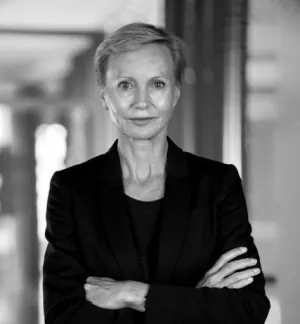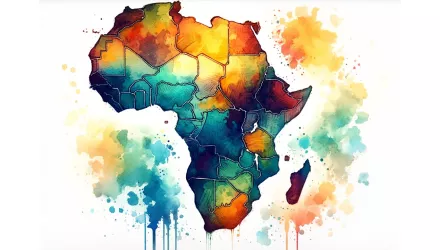Democratic Transitions and Conflict Zones: The Impact on Policy-Making in Africa
Session 1 of the Africa Beyond the Headlines study group
Session 1 of the Africa Beyond the Headlines study group
Related Programs
Over the course of five sessions, this study group, led by Dr. Gloria Ayee, is exploring the pivotal moment experienced by the African continent. With youthful populations, abundant resources, and growing economic and technological capacity, Africa holds solutions to global challenges from food security to climate change. Participants of the study group are invited to reflect on the role that international cooperation must play in supporting inclusive, sustainable development in Africa, as well as to move beyond outdated perspectives and learn about Africa’s profound transformation through trade, investments in clean energy and health, and youth empowerment initiatives. Participants are also given the opportunity to prepare one policy memo on a topic related to one of the sessions and to provide a memo briefing the study group and to a relevant external expert guest.
On March 26, the study group met for the first time to examine recent democratic progress and backsliding in African countries. The session focused on ongoing conflicts in different regions of Africa and examined their political underpinnings. Participants also discussed the role of third-party actors in supporting and facilitating conflict mediation and peacebuilding efforts in the continent. The study group counted with the presence of external expert guest Dr. Antje Herrberg, Chief of Staff of the European Union Capacity Building Mission in Niger (EUCAP Sahel Niger). Dr. Herrberg brings more than two decades of professional and personal experience in transition and conflict resolution, intractable conflict, and terrorism with a deep interest to alleviate the suffering of people. Furthermore, Florian Dirmayer, Master in Public Policy Candidate at Harvard Kennedy School, delivered a memo briefing on European Union Security Cooperation with Niger After the 2023 Military Coup.
The evolving landscape of African peace and security is experiencing a notable shift from traditional peace mediation efforts to more security-oriented approaches. This shift is underscored by the increasing influence of external actors in the continent, including Russia and the Wagner Group, and it represents both challenges and opportunities for engaging in conflict zones. In the 2020s, there have been ten successful and six unsuccessful coup d’états across the continent, a significant increase in numbers and a concerning trend, highlighting the complexities of engagement and the need to search for effective strategies that can foster dialogue and understanding amidst political upheaval.
Decades after the establishment of modern democratic institutions in multiple African countries, the continent remains at a critical juncture with increasing authoritarian trends spreading across societies and military juntas becoming more successful at capturing political power. Contributing factors that might be undermining the survival and health of democratic governance include the impact of systemic corruption, the pervasive threat of disinformation and misinformation, and the viability of long-promoted power-sharing agreements.
In light of increasing challenges, there are opportunities related to the redefining of democracy and engagement. As African countries navigate the complexities of democratic governance amidst decreasing degrees of public trust in what can be labeled as Western-informed models, there is an increasingly relevant call for a reevaluation of what democracy can mean for the continent. This reevaluation could explore indigenous frameworks that can contribute to the respect of the unique political, social, and cultural contexts of different African states, and extends to the nature of Africa’s relationship with international partners. Such relationship would benefit from advocating for a reciprocal and symbiotic partnership that leaves behind fixed prescriptive engagements and integrates the autonomy and agency of African countries and societies.
In the complex development of African politics, as they pertain to peace and security, third-party actors have the potential to play a pivotal role in shaping democratic transitions and navigating conflict zones. As well-intended as their involvement may be, there is a critical need for nuanced understandings and appreciation of the continent’s diverse realities through third-party engagement. In this regard, the European Union’s systematic approach offers lessons in the importance of direct, ground-level interactions. Insights on the experience of such an approach highlight the delicate dynamics of trust, engaged dialogue, and the practical challenges of aligning external support with Africa’s political and social fabric. It is essential that third-party actors adapt and recalibrate their strategies so that they can have an impact that goes beyond addressing immediate challenges of conflict and governance and also embraces opportunities for genuine, cooperative, and sustainable partnerships that resonate with Africa’s diverse aspirations and values.
The clear necessity for a more nuanced and inclusive approach to policy-making in the context of peace and security in Africa calls for the attention of relevant stakeholders in local, national, regional, and international contexts. By recognizing the varied landscapes of conflict, governance, and international cooperation, as well as the inter-connected security challenges posed by democratic erosion, increased migration, and climate-related security impacts, a pressing requirement arises for approaches that are grounded in respect, understanding, and genuine engagement. The future of Africa's political and developmental trajectory will significantly benefit from embracing diverse models of democracy and governance, models that are based on the wealthy and rich diversity to be found in the continent’s societies, ensuring that efforts to build and stabilize nations are informed by the voices and experiences of those most affected.
Martín Rodríguez , Alejandro. “Democratic Transitions and Conflict Zones: The Impact on Policy-Making in Africa.” Belfer Center for Science and International Affairs, Harvard Kennedy School, March 28, 2024
Democratic Transitions and Conflict Zones: The Impact on Policy-Making in Africa
Martín Rodríguez , Alejandro. “Democratic Transitions and Conflict Zones: The Impact on Policy-Making in Africa.” Belfer Center for Science and International Affairs, Harvard Kennedy School, March 28, 2024


From Africa Futures Project
